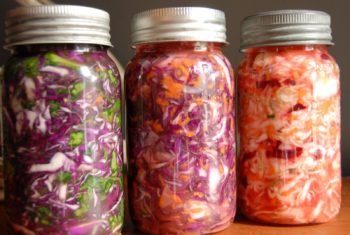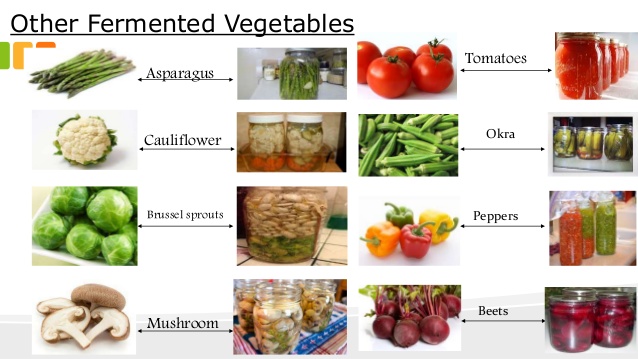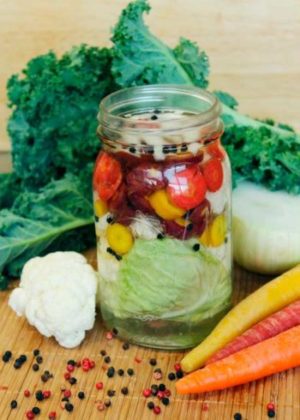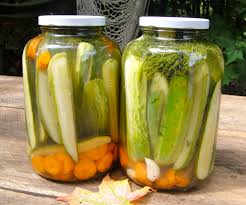This article was previously posted under “general health” but with the impending shortage of food it has been re-posted to bring to attention that fermenting vegetables and fruit is one way to store and preserve food for times of scarcity. Commentators and food analysts are saying that the era of cheap food is behind us and food shortages will be with us in the not too distant future. With this in mind it is incumbent upon every household to practice good husbandry and have an emergency supply of food. Certain foods, of course, are more perishable than others and those that will last are what are known as “dry foods” such as legumes, pulses (kidney beans, lentils, chick peas, black eyed peas etc), rice, pasta. Tinned foods, as usual, will always feature when it comes to emergency supplies but not many people are aware of the fact that fermented foods are not only healthy but by virtue of the fact that they are anaerobic ( without air) they can last for prolonged periods of time, even years. So when you have a surplus of cabbage, cauliflower, beet and even fruits don’t let them spoil, just ferment them.
Cultured or fermented foods have a very long history in virtually all native diets, and have always been highly prized for their health benefits.
Fermentation has been defined as “a biochemical change which is brought about by the anaerobic (absence of oxygen) or partially anaerobic oxidation of carbohydrates by either micro-organisms or enzymes.” This is distinct from putrefaction which is proteins being broken down.
The bacteria that live in our gut are essential. They help with digestion, absorption and assimilation of nutrients. Plus, they play a role in the function of our immune system. However there are ‘bad’ bacteria that also reside in the gut and the challenge is achieving the right balance between the two. When the balance is shifted in favour of the bad bacteria, symptoms may arise such as bloating, constipation or diarrhoea. This is termed ‘dysbiosis’ – the state in which the gut flora are out of balance. Modern diets, high in refined sugars and busy, stressful lifestyles can contribute to dysbiosis by feeding the bad bacteria, enabling them to flourish. Eliminating refined, high sugar foods and including probiotic-rich fermented foods is thought to bring the gut back into balance and support the immune system.
Fermented foods are foods that have been through a process of lacto-fermentation in which natural bacteria feed on the sugar and starch in the food creating lactic acid. This process preserves the food, and creates beneficial enzymes, b-vitamins, Omega-3 fatty acids, and various strains of probiotics. There are four important health benefits of traditional fermented foods that clearly explain why they are so crucial to maintaining a healthy gut:
Traditional fermented foods help balance the production of stomach acid and also have the unique ability to ease digestive discomfort related to having either too much or too little stomach acid. When the production of hydrochloric acid by the stomach is low, fermented foods help increase the acidity of gastric juices. On the other hand, when the stomach produces too much acid, fermented foods help protect the stomach and intestinal lining. As we age, our production of the digestive enzymes and juices required for proper digestion begins to decrease. Eating traditional fermented foods like sauerkraut, buttermilk, and pickled vegetables can help make up for this loss. The key is to eat a small portion once or twice daily with meals.
Traditional fermented foods help the body produce acetylcholine. Acetylcholine is a neurotransmitter that facilitates the transmission of nerve impulses. Within the context of digestion, it helps increase the movement of the bowel, and can help reduce constipation It also helps improve the release of digestive juices and enzymes from the stomach, the pancreas, and the gallbladder. So by helping your body produce acetylcholine, fermented foods act as potent digestive aids.
Traditional fermented foods are beneficial for people with diabetes. In addition to improving pancreatic function, which is of great benefit to diabetics, the carbohydrates in lactic acid–fermented foods have been broken down or “pre-digested.” As a result, they do not place an extra burden on the pancreas, unlike ordinary carbohydrates.
Traditional fermented foods produce numerous unknown compounds that destroy and inhibit the growth of pathogenic (disease causing) bacteria. Many pathogenic forms of bacteria are sensitive to acidic environments. This is true of both cholera and typhoid. In the early 1950s, during an epidemic of typhoid fever in Europe, reports emerged showing that fresh sauerkraut was an effective agent for killing the bacteria. More recently, German scientists were working with a strain of lactic acid bacteria found in sourdough bread, and discovered that it seemed to be more effective than other strains at killing microbes. In early lab results, it quickly eliminated the super-bugs currently resistant to most antibiotics.
The concept of using naturally occurring “bugs” to eliminate harmful bacteria is an idea that seems to be gaining speed, although it is still baffling why many conventional doctors have yet to fully grasp or accept this concept. Obviously, the pharmaceutical companies stand to make a lot more money by selling antibiotics and other medications than by recommending a daily dose of fermented cabbage.
Fermented foods are some of the best chelators available. The beneficial bacteria in these foods are highly potent detoxifiers, capable of drawing out a wide range of toxins and heavy metals from the body, especially the liver. Adding a small amount of fermented food to each meal will give you one of the biggest health benefits you will ever achieve because they can contain 100 times more probiotics than a supplement. As long as you vary the fermented and cultured foods you eat, you’ll get a much wider variety of beneficial bacteria than you could ever get from a supplement.
Your gut bacteria play key roles in:
Behaviour. A study published in Neurogastroenterology & Motility found that mice lacking in gut bacteria behave differently from normal mice, engaging in what would be referred to as “high-risk behavior.” This altered behavior was accompanied by neurochemical changes in their brains. In fact,your gut serves as your second brain. It produces more of the neurotransmitter serotonin, which is known to have a positive influence on your mood, than your brain does.
Gene expression. A probiotic-rich beverage has been shown to influence the activity of hundreds of your genes to help them express in a positive, disease-fighting way. This makes your gut health a very powerful variable of epigenetics a cutting-edge field of medicine showing that your lifestyle plays a significant role in your genetic expression.
Diabetes. According to a study from Denmark, bacterial population in the gut of diabetics differs from non-diabetics. According to the authors, the results of their study indicate that type 2 diabetes in humans is linked to compositional changes in intestinal microbiota. A healthy diet – low in sugar and grains; high in whole raw foods and fermented foods – allows your beneficial gut bacteria to flourish.
Autism. Establishment of normal gut flora in the first 20 days or so of life is critical in appropriate maturation of your baby’s immune system. Hence, babies with abnormal gut flora have compromised immune systems and are particularly at risk for developing ADHD, learning disabilities, and autism, especially if they are vaccinated before restoring balance to their gut flora. It has also been said that any dysfunction of the brain is usually connected to what’s going on in the digestive system, so improving the quality of the gut bacteria could benefit those suffering from the issues mentioned above.
Obesity. Probiotics may help fight obesity. Restoring your gut flora is therefore a crucial consideration if you’re struggling to lose weight. Fermented foods also reduce the uptake of sugars and starches. You will also be surprised how many symptoms of illness originate from your digestive system. Once you make this system healthy and working properly again those symptoms will start to disappear. This is especially true in relation to autoimmune diseases such as multiple sclerosis, chronic fatigue syndrome, lupus, kidney problems, type i diabetes, crohn’s disease, fibromyalgia, urinary conditions, rheumatoid arthritis, ulcerative colitis, osteoarthritis, chronic skin conditions and inflammatory bowel disease.
Your gut is home to both good and bad bacteria, which outnumber the cells in your body by at least 10 to one. The challenge is optimizing the bacterial population in your gut: striving for an ideal good to bad bacteria ratio. This can help them live in a beneficial, symbiotic relationship to help nourish you and fight disease.

Here is a summary for making your own fermented vegetables:
Shred and cut your chosen vegetables. Juice some celery. This is used as the brine, as it contains natural sodium and keeps the vegetables anaerobic. This eliminates the need for sea salt, which prevents growth of pathogenic bacteria. Pack the veggies and celery juice into a 32-ounce wide-mouthed canning jar. A kraut pounder tool can be helpful to pack the jar and eliminate any air pockets. Top with a cabbage leaf, tucking it down the sides. Make sure the veggies are completely covered with celery juice and that the juice is all the way to the top of the jar to eliminate trapped air. Seal the jar store in a warm, slightly moist place for 24 to 96 hours, depending on the food being cultured. Ideal temperature range is 68-75 degrees Fahrenheit; 85 degrees max. Remember, heat kills the microbes! When done, store in the refrigerator to slow down the fermentation process.
Incidentally, there are two different kinds of pickles. When you preserve cucumbers in vinegar, you get pickles. But when you soak cucumbers in a salt-water brine, you get probiotic pickles. One pickle can contain up to 20 percent of your daily Vitamin K value—a vitamin essential to bone and heart health.
Disclaimer: The contents of this website are not intended to replace a one to one relationship with your health practitioner nor are they meant as medical advice. You are encouraged to do your own research and make your own decisions in p
